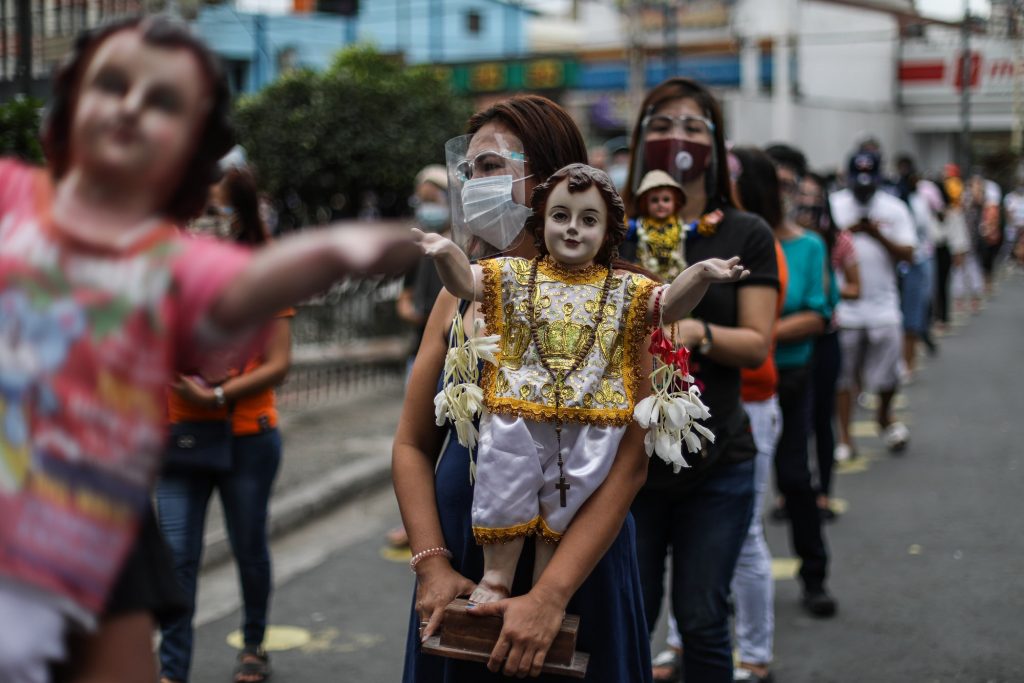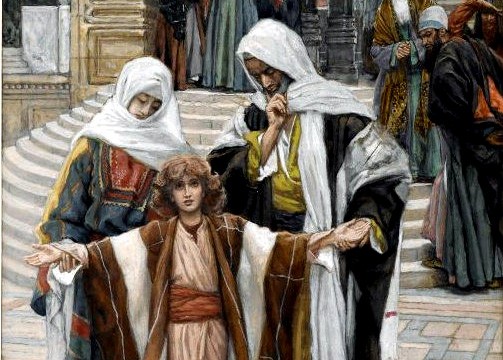
One of the most curious questions I ever got from a ten-year child was, “Did Jesus ever have a misunderstanding with his parents?”
I was still a seminarian back then, teaching catechism in a public school for grade six students. I remember saying YES to him and giving our Gospel reading today as an example. You heard St. Luke in today’s Gospel explicitly saying, his parents “did not understand him.”
On this feast day that is peculiar to the Catholic Church in the Philippines, the image that we get of the Santo Niño is not that of a cute Infant Jesus, overdressed into a prince, wearing a crown and holding a scepter in one hand and holding world in his other hand.
What we have instead is the picture of a boy who is beginning to assert his independence, and is beginning to reason out with his parents like an adult. In Tagalog we’d call him NAGIGING PASAWAY (showing some defiance), GUMAGAWA NA NG SARILING LAKAD (trying to walk his own way already).
The Gospel writer tells us he was 12 years old when this happened. That was the specific stage in the life of a Jewish boy when he was expected to start behaving as a young man. He was supposed to work double time on learning the Law of Moses because he was about to enter the age 13, the age of accountability.
You see, when a child makes mistakes or commits acts of misdemeanor, it is his parents who are held accountable for it. Our common reasoning is, “He’s just a child.” Meaning, he’s still under the wings of his parents.
For the Jewish people, there is a time when the child transitions into a young man, when he is supposed to start answering for himself. They call it BAR MITZVAH, the ritual of COMING OF AGE. Literally, BAR MITZVAH means “Son of the Law or Commandment.” I think there is something universal about this. Even in English, the age 13 is the time the child becomes a TEEN-AGER. In Tagalog, the male child who enters teen-age life is called NAGBIBINATA, meaning, “hindi na bata.” In Kapampangan, interistingly, our term for BINATA is BAINTAU, which literally means a NEW HUMAN BEING. It is the stage when begins to search what it means to be a man.
In the Joyful mysteries of the Rosary, we refer to this passage as the FINDING OF JESUS IN THE TEMPLE, as if the boy was lost. He wasn’t lost. He deliberately went his own way; it was his parents who lost him.
In my book Yeshua, reading between the lines of Luke’s story about the Holy Family going to Jerusalem each year for the Passover Festival (which lasted for about eight days), I suggested that most likely, they must have stayed in the house of Zechariah and Elizabeth. The boy Jesus must have looked forward to this yearly vacation in Judea, his time to be with his cousin John, who was only six months older than him.

I imagine that this must have been Jesus’ opportunity to learn what his cousin John was learning in the Rabbinical schools in Jerusalem, where he was being groomed to become a temple priest like his father Zechariah. He must have sat in at John’s classes and found the discussions very fascinating, such that he had a heavy heart whenever his vacation came to an end and he had to return with his parents to Nazareth. And so it happened that one day, he decided to stay behind.
The Lebanese-American poet Kahlil Gibran once wrote a poem reminding parents how they must behave when their children are beginning to come of age and walk their own paths in life. He said:
“Your children are not your children.
They are sons and daughters of Life’s longing for itself.
They come through you but not from you.
And though they are with you yet they belong not to you.
You may give them your love but not your thoughts,
For they have their own thoughts.
You may house their bodies but not their souls,
For their souls dwell in the house of tomorrow,
Which you cannot visit, not even in your dreams.
You may strive to be like them,
but seek not to make them like you.
For life goes not backward nor tarries with yesterday.”
There is a time in their lives when children simply obey and say yes very subserviently to their parents. But inevitably, the time comes when they begin to explore the world, when they begin to ask questions like WHO AM I? WHAT IS MY PURPOSE IN THIS WORLD?
They become more inquisitive, more adventurous, sometimes even reckless. They begin to experiment on things that they were not allowed to do before.
Luke says Jesus asked his parents, WHY DID YOU LOOK FOR ME? He was not really being disrespectful. He was being candid about what he was going through. That he was looking for himself, his true identity, his calling, his mission in life. And he felt, probably to the dismay of Joseph, he was finding it, not in carpentry work but in teaching, in doing a Rabbi’s work.
He must have turned into an avid reader and learner of the Jewish Scriptures, that is why he was drawn to the temple, to the wise teachers in the schools attended by his cousin John. That is why he called the temple HIS HOME. It was there where he was finding a NEW SPIRITUAL & INTELLECTUAL HOME. Yes, he was his parent’s son, but he was also growing in awareness that he was a Son of his Heavenly Father, who is calling him to fulfill his life’s purpose.
This stage we call coming of age for children is not an age for parents to just let go and leave their children by themselves. It is rather a time when parents have to learn to be present with their children in a different way. It is the time when they themselves have to learn to let go of their overprotective tendencies. A time to give their children some distance but be there for them, to accompany them, to mentor them, to allow them to ask questions, to let go of the idea of making them into carbon copies of themselves.
I remember the time when my own late father began inviting me to take long walks with him with our dog Henry, along the railway of Betis. That was the time when I felt he was no longer treating me like a child but as a young man. Often we just walked in silence. When I asked questions, he really listened and took my questions seriously. He had just joined the Cursillo movement back then and he took me with him every now and then to attend Mass at the San Fernando Cathedral, and we would have a warm bowl of mami noodle soup at Everybody’s Cafe afterwards. I remember him asking me if I understood what the priest said, and he would elaborate on it if I asked him to.
I think during those times that I was transitioning into a young man, he himself was transitioning, from raising me as his child to raising me as a child of God, a brother of humankind, a good citizen of our country and the world, a member of God’s family, a SANTO NINO.
Homily of Bishop Pablo Virgilio David of Kalookan for the Feast of Santo Nino, 16 Jan 2022, Luke 2:41-52
Source: Licas Philippines
0 Comments